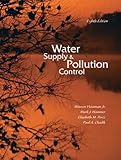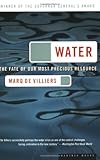|
|
Help |
| Home - Basic W - Water Pollution (Books) | |
e99 Online Shopping Mall
|
|
Help |
| Home - Basic W - Water Pollution (Books) | |
| 1-20 of 100 | Next 20 |
click price to see details click image to enlarge click link to go to the store
| 1. Water Wars: Privatization, Pollution, and Profit by Vandana Shiva | |
 | Paperback: 158
Pages
(2002-02)
list price: US$15.00 -- used & new: US$8.66 (price subject to change: see help) Asin: 089608650X Average Customer Review: Canada | United Kingdom | Germany | France | Japan |
|
Editorial Review Product Description Customer Reviews (15)
| |
| 2. Water Supply and Pollution Control (8th Edition) by Warren Viessman Jr., Mark J. Hammer, Elizabeth M. Perez, Paul A. Chadik | |
 | Hardcover: 864
Pages
(2008-06-19)
list price: US$170.00 -- used & new: US$148.56 (price subject to change: see help) Asin: 0132337177 Average Customer Review: Canada | United Kingdom | Germany | France | Japan |
|
Editorial Review Product Description This book provides practicing engineers with water-based environment engineering from theory to practice by presenting the principles of water treatment, wastewater treatment, water reuse, water quality, and overviews of regulations regarding pollution control and drinking water quality. The Eighth Edition features new and updated coverage of GIS, climate change, alternative water supply development, hydraulics, stormwater treatment techniques, water quality regulations, filter design, and more. Recognizing that all waters are potential sources of supply, the authors present treatment processes in the context of what they can do, rather than dividing them along clean water or waste water lines. For practicing engineers who need a good reference book and for those preparing to take the examination for licensing as a professional engineer. Customer Reviews (3)
| |
| 3. Don't Drink The Water (without reading this book) The essential Guide to Our Contaminated Drinking Water and What You Can Do About It by Lono Kahuna Kupua A'o | |
 | Paperback: 112
Pages
(2004-01-25)
list price: US$11.95 -- used & new: US$4.20 (price subject to change: see help) Asin: 096288829X Average Customer Review: Canada | United Kingdom | Germany | France | Japan |
|
Editorial Review Product Description Customer Reviews (5)
[ 1991-1992EPA records showed that the nations water systems committed over 250,000violations of the Safe Drinking Water Act, affecting more than 100 millionAmericans - and 10% of those exceeded the MCL (Max Contaminant Level) ofthe EPA. ] This book is a great start finding out the truth of thematter. Toxins are everywhere!We all need to learn where they exist andremove them for our own and our childrens sake. Someday, a high rankingofficial on TV may review this book, or a similar subject and try and spinthese numbers a certain way to make it not sound so bad, but don't befooled.Statistics seldom lie.Only politicians do.Politicians can comefrom any field, not just government.Politicians come from industry,medicine, lobby, and big business etc.Be a detective, and look foranything that doesn't make sense. "The Truth is Obvious, EverythingElse is Questionable"
| |
| 4. Industrial Water Pollution Control by W.Wesley Eckenfelder | |
 | Paperback: 416
Pages
(2000-10-01)
-- used & new: US$237.44 (price subject to change: see help) Asin: 0071162755 Canada | United Kingdom | Germany | France | Japan |
|
Editorial Review Product Description | |
| 5. Clean Water: An Introduction to Water Quality and Pollution Control by Kenneth M. Vigil | |
 | Paperback: 181
Pages
(2003-04)
list price: US$19.95 -- used & new: US$10.50 (price subject to change: see help) Asin: 0870714988 Average Customer Review: Canada | United Kingdom | Germany | France | Japan |
|
Editorial Review Product Description Most other books on water quality and pollution control are highly technical and very specific, and are aimed at engineers, scientists, or attorneys. "Clean Water," on the other hand, is a comprehensive discussion of the subject intended for a wider audience of science students, educators, and concerned citizens. Using photos and diagrams to illustrate and explain concepts, Vigil provides sufficient detail to educate readers about many broad topics and includes additional references at the end of each chapter for exploring specific topics in more detail. "Clean Water" summarizes the basic fundamentals of water chemistry and microbiology and outlines important water quality rules and regulations, all in concise, understandable prose. It describes the basic scientific principles behind water pollution control and the broader approach of addressing water pollution problems through watershed management. There are sections on drinking water and a concluding chapter entitled "Getting Personal about Clean Water" about citizen involvement at home and in the community. Customer Reviews (1)
| |
| 6. Mine Water: Hydrology, Pollution, Remediation (Environmental Pollution) (Volume 0) by Paul L. Younger, S.A. Banwart, Robert S. Hedin | |
 | Paperback: 464
Pages
(2002-02-01)
list price: US$169.00 -- used & new: US$120.00 (price subject to change: see help) Asin: 140200138X Average Customer Review: Canada | United Kingdom | Germany | France | Japan |
|
Editorial Review Product Description Customer Reviews (1)
| |
| 7. Water Pollution (True Books: Environment) by Rhonda Lucas Donald | |
 | Paperback: 48
Pages
(2002-03)
list price: US$6.95 -- used & new: US$3.18 (price subject to change: see help) Asin: 0516273574 Canada | United Kingdom | Germany | France | Japan |
| 8. Water Pollution and Fish Physiology by Alan G. Heath | |
 | Hardcover: 384
Pages
(1995-09-14)
list price: US$199.95 -- used & new: US$199.95 (price subject to change: see help) Asin: 0873716329 Canada | United Kingdom | Germany | France | Japan |
|
Editorial Review Product Description | |
| 9. Water Quality: Diffuse Pollution and Watershed Management, 2nd Edition by Vladimir Novotny | |
 | Hardcover: 888
Pages
(2002-11-15)
list price: US$235.00 -- used & new: US$181.54 (price subject to change: see help) Asin: 0471396338 Average Customer Review: Canada | United Kingdom | Germany | France | Japan |
|
Editorial Review Product Description Customer Reviews (3)
| |
| 10. Water Supply and Pollution Control (7th Edition) by Warren Viessman Jr., Mark J. Hammer | |
 | Hardcover: 888
Pages
(2004-05-14)
list price: US$154.00 -- used & new: US$29.95 (price subject to change: see help) Asin: 0131409700 Average Customer Review: Canada | United Kingdom | Germany | France | Japan |
|
Editorial Review Product Description Customer Reviews (5)
| |
| 11. Water: The Fate of Our Most Precious Resource by Marq de Villiers | |
 | Paperback: 368
Pages
(2001-07-12)
list price: US$16.00 -- used & new: US$7.95 (price subject to change: see help) Asin: 0618127445 Average Customer Review: Canada | United Kingdom | Germany | France | Japan |
|
Editorial Review Product Description De Villiers examines the checkeredhistory of humankind's management of water--which, he hastens toremind us, is not a renewable resource in many parts of the world. Oneof them is the Nile River region, burdened by overpopulation. Anotheris the Sahara, where Libyan ruler Muammar Qaddafi is pressing anambitious, and potentially environmentally disastrous, campaign tomine deep underground aquifers to make the desert green. Another isnorthern China, where the damaging effects of irrigation havedestroyed once-mighty rivers, and the Aral Sea of Central Asia, whichwas killed within a human lifetime. And still another is the AmericanSouthwest, where crops more fitting to a jungle than a dry land arenursed. De Villiers travels to all these places, reporting on what hesees and delivering news that is rarely good. De Villiers has akeen eye for detail and a solid command of the scientific literatureon which his argument is based. He's also a fine storyteller, and hiswide-ranging book makes a useful companion to Marc Reisner's classicCadillac Desertand other works that call our attention to a globally abused--andvital--resource. --Gregory McNamee Customer Reviews (14)
| |
| 12. Basic Environmental Technology: Water Supply, Waste Management & Pollution Control (5th Edition) by Jerry A. Nathanson | |
 | Hardcover: 500
Pages
(2007-04-07)
list price: US$130.40 -- used & new: US$85.00 (price subject to change: see help) Asin: 0131190822 Canada | United Kingdom | Germany | France | Japan |
|
Editorial Review Product Description | |
| 13. Water Pollution (Our Environment) by Peggy Parks | |
 | Hardcover: 48
Pages
(2007-06-04)
list price: US$27.50 -- used & new: US$23.44 (price subject to change: see help) Asin: 0737736674 Average Customer Review: Canada | United Kingdom | Germany | France | Japan |
Customer Reviews (1)
| |
| 14. Instrumentation in Wastewater Treatment Facilities - Mop 21 (Water Pollution Control Federation//Manual of Practice) by Water Environment Federation, Task Force on Instrumentation in Wastewater Treatment Facilities | |
| Paperback: 344
Pages
(1993-01)
list price: US$55.00 -- used & new: US$9.00 (price subject to change: see help) Asin: 188136934X Canada | United Kingdom | Germany | France | Japan | |
| 15. Small Water System Treatment Costs (Pollution Technology Review) by Robert C. Gumerman | |
| Hardcover: 568
Pages
(1986-10)
list price: US$48.00 Isbn: 0815511019 Canada | United Kingdom | Germany | France | Japan | |
| 16. Information Technology in Water and Wastewater Utilities, WEF MOP 33 (Water Resources and Environmental Engineering Series) by Water Environment Federation | |
 | Hardcover: 376
Pages
(2010-09-10)
list price: US$100.00 -- used & new: US$83.35 (price subject to change: see help) Asin: 0071737057 Canada | United Kingdom | Germany | France | Japan |
|
Editorial Review Product Description This Water Environment Federation resource presents an overview of the information technology (IT) systems, practices, and applications most relevant to utilities. Information Technology in Water and Wastewater Utilities covers strategic planning, IT program development, project management, infrastructure, security, organizational issues, success factors, and challenges. Six real-world case studies highlight specific technical details and illustrate the concepts presented in this authoritative guide. Information Technology in Waste and Wastewater Utilities covers: | |
| 17. Water Pollution (New True Books) by Darlene R. Stille | |
| Paperback:
Pages
(1990-04)
list price: US$5.50 -- used & new: US$2.50 (price subject to change: see help) Asin: 051641190X Average Customer Review: Canada | United Kingdom | Germany | France | Japan | |
|
Editorial Review Product Description Customer Reviews (1)
| |
| 18. Water and Wastewater Technology (6th Edition) by Mark J. Hammer | |
 | Hardcover: 376
Pages
(2007-06-15)
list price: US$130.40 -- used & new: US$88.69 (price subject to change: see help) Asin: 0131745425 Average Customer Review: Canada | United Kingdom | Germany | France | Japan |
|
Editorial Review Product Description Customer Reviews (5)
| |
| 19. The Science of Water: Concepts and Applications, Second Edition by Frank R. Spellman | |
 | Hardcover: 448
Pages
(2007-09-07)
list price: US$106.95 -- used & new: US$101.00 (price subject to change: see help) Asin: 1420055445 Canada | United Kingdom | Germany | France | Japan |
|
Editorial Review Product Description | |
| 20. Freshwater Recreational Fishing: The National Benefits of Water Pollution Control (RFF Press) by Professor William J. Vaughan, Professor Clifford S. Russell | |
| Paperback: 224
Pages
(1982-10-01)
list price: US$15.00 Isbn: 0801829860 Canada | United Kingdom | Germany | France | Japan | |
| 1-20 of 100 | Next 20 |